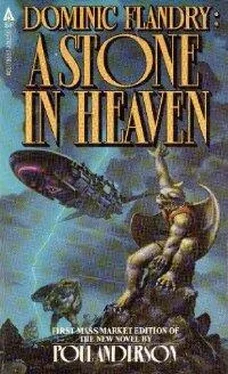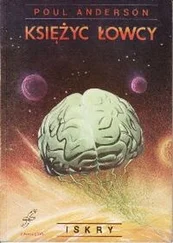The war had also resulted in making it an interstellar power. It assumed protectorship over the defeated Baburites; they were too alien for close relations, but what there were, political and commercial, appeared to have been pretty amicable through the centuries. Hermetians started colonies and enterprises in several nearby systems. Most significantly, they had stewardship of Mirkheim, the sole known source of supermetals.
They needed their wealth and strength, for the Troubles were upon Technic civilization. Wars, revolutions, plundering raids raged throughout its space. Hermes must often fight. This led to a military-oriented state and a concentration of authority in the executive. When at last Manuel had established the Terran Empire and its Pax was spreading afar, that state was able to join on highly favorable terms.
Afterward … well, naturally the files couldn’t say so ;but as the Empire decayed, Hermes did too. Again and again, lordship went to the man with the armed force to take if. The economy declined, the sphere of influence shrank. Hans Molitor finally reasserted the supremacy of Terra. Generally he was welcomed by folk weary of chaos. But he had political debts to pay, and one payment involved putting lucrative Mirkheim directly under the Imperium. It was then a reasonable precaution to reduce sharply the autonomy of the Grand Duchy, disband its fighting services, require its businesses to mesh with some elsewhere—which worsened resentment. Riots erupted and Imperial agents were murdered, before the Marines restored order.
Today’s Duke, Edwin Cairncross, appeared properly submissive; but appearances were not very reliable across a couple of hundred light-years, and certainly he had several odd items in his record. Now fifty-five, he had been the youngest son by a second marriage of a predecessor who gave Hans much trouble before yielding. Thus he had no obvious prospect of becoming more than a member of the gentry. Reviving an old Hermetian tradition, he enlisted in the Imperial Navy for a five-year hitch and left it bearing the rank of lieutenant commander. That was only partly due to family; he had served well, earning promotions during the suppression of the Nyanzan revolt and in the Syrax confrontation.
Returning home, he embarked energetically on a number of projects. Among these, he enlarged what had been a petty industrial operation on the strange planet Ramnu and its moons. Meanwhile he held a succession of political posts and built up support for himself. Ten years ago, he became ready to compel the abdication of his older half-brother and his own election to the throne. Since then, he had put various measures into effect and undertaken various public works that were popular.
Hence on the surface, he seemed a desirable man in his position. The staff of the Imperial legate on Hermes were less sure of that. Their reports over the past decade showed increasing worry. Cairncross’ image, writings, recorded speeches were everywhere. Half the adolescents on the home globe joined an organization which was devoted to outdoorsmanship and sports but which was called the Cairncross Pioneers; its counselors preached a patriotism that was integral with adoration of him. Scholars were prodded into putting on symposia about his achievements and his prospects for restoring the greatness of his people. News media trumpeted his glories.
None of this was actually subversive. Many local lords exhibited egomania but were otherwise harmless. However, it was a possible danger signal. The impression was reinforced by the legate’s getting no more exact information than law required—on space traffic, demography, production and distribution of specified goods, etc.—and his agents being unable to gather more for themselves or even ascertain whether what they were given was accurate. “We respect the right of individual choice here” was the usual bland response to an inquiry. The Babur Protectorate had been virtually sealed off: ostensibly at the desire of the natives, who were not Imperial subjects and therefore were free to demand it; but how could an outsider tell? Anything might be in preparation, anywhere throughout a volume of space that included scores of suns. Recent messages from the legate urged that Terra mount a full investigation.
The recommendation has drowned, Flandry thought, in the data, pleas, alarms that come here from a hundred thousand worlds. It has never gotten anywhere near the attention of the Policy Board. No lower-echelon official has flagged it. Why should he? Hermes is far off, close to that march of the Empire. By no possibility could it muster the power to make itself independent again, let alone pose any serious threat to Terra. The clearly dangerous cases are too many, too many.
Is there a danger, anyway … when the Duke has arrived of his free will and wants to see me, of all unlikely candidates?
Flandry searched for personal items. They were surprisingly few, considering what a cult the chap had built around himself. Cairncross was long married, but childlessly; indications were that that was due to a flaw in him, not his wife. Yet he had never cloned, which seemed odd for an egotist unless you supposed that his vainglory was too much for him to make such an admission. He was a mighty womanizer, but usually picked his bedmates from the lower classes and took care to keep them humble. Men found him genial when he was in the right mood, though always somewhat overawing, and terrifying when he grew angry. He had no close friends, but was generally considered to be trustworthy and a just master. He was an ardent sportsman, hunter, crack shot; he piloted his own spacecraft and had explored lethally unterrestroid environments; he was an excellent amateur cabinetmaker; his tastes were fairly simple, except that he enjoyed and understood wine; distilled beverages he consumed a bit heavily, without showing any effects; he was not known to use more drugs than alcohol—
Flandry decided to receive him in this office.
“Welcome, your Grace.”
“Thank you.” A firm handshake ended. Cairncross was putting on no airs. “Please be seated. May I offer your Grace refreshments? I’m well stocked.”
“M-m-m … Scotch and soda, then. And let’s drop the titles while we’re the two of us. I aim to talk frankly.”
Chives shimmered in and took orders. Cairncross stared curiously after the Shalmuan—probably he’d never met any before—and swung attention back to his host. “Well, well,” he said. “So this is the legendary Admiral Flandry.”
“No, the objectively real Admiral Flandry, I hope. Some would say objectionably real.”
Cairncross formed a smile and a chuckle, both short-lived. “The objectors have ample cause,” he said. “Thank God for that.”
“Indeed?”
“They’ve been our enemies, haven’t they? I know why you got that medallion you’re wearing. The business wasn’t publicized—would’ve been awkward for diplomacy, right?—but a man in my kind of position has ways of learning things if he’s interested. You pulled the fangs of the Merseians at Chereion, and we no longer have to worry about them.”
Flandry quelled a wince, for that episode had cost him heavily. “Oh, but I’m afraid we do,” he said. “Their Intelligence apparatus suffered severe damage, true. However, nothing else did, and they’re hard at work rebuilding it. They’ll be giving us fun and games again.”
“Not if we stay strong.” Cairncross’ gaze probed and probed. “Which is basically what I’m here about.”
Flandry returned the look. Cairncross was tall and broad, with a tigerish suppleness to his movements. His face was wide on a wedge-shaped cranium, Roman-nosed, thin-lipped, fully de-bearded. The hair was red and starting to get scant, the eyes pale blue, the complexion fair and slightly freckled. His voice was deep and sonorous, crisply accented. He was wearing ordinary civilian garb, blouse and trousers in subdued hues, but a massive ring of gold and emerald sparkled on a furry finger.
Читать дальше











